BUACC5935: Auditing and Assurance Services Essay on Big Four
VerifiedAdded on 2023/01/18
|13
|3498
|38
Essay
AI Summary
This essay delves into the critical aspects of auditing and assurance services, examining the role of the Big Four audit firms (PwC, KPMG, Deloitte, and EY) and the need for Banking Royal Commission scrutiny due to potential breaches of auditor independence and objectivity stemming from providing excessive non-audit services. The essay supports the claim that the Banking Royal Commission should investigate the audit works of the Big Four accounting firms. The essay then shifts focus to the Australian audit profession, outlining both opportunities, such as the increasing importance of audit and assurance services and the incorporation of AI tools, and challenges, including complexities in financial reporting. The essay also addresses recent regulatory reforms aimed at improving audit quality in Australia, supported by relevant examples. Overall, the essay argues for the importance of audit quality and the need for continuous improvement in the field.
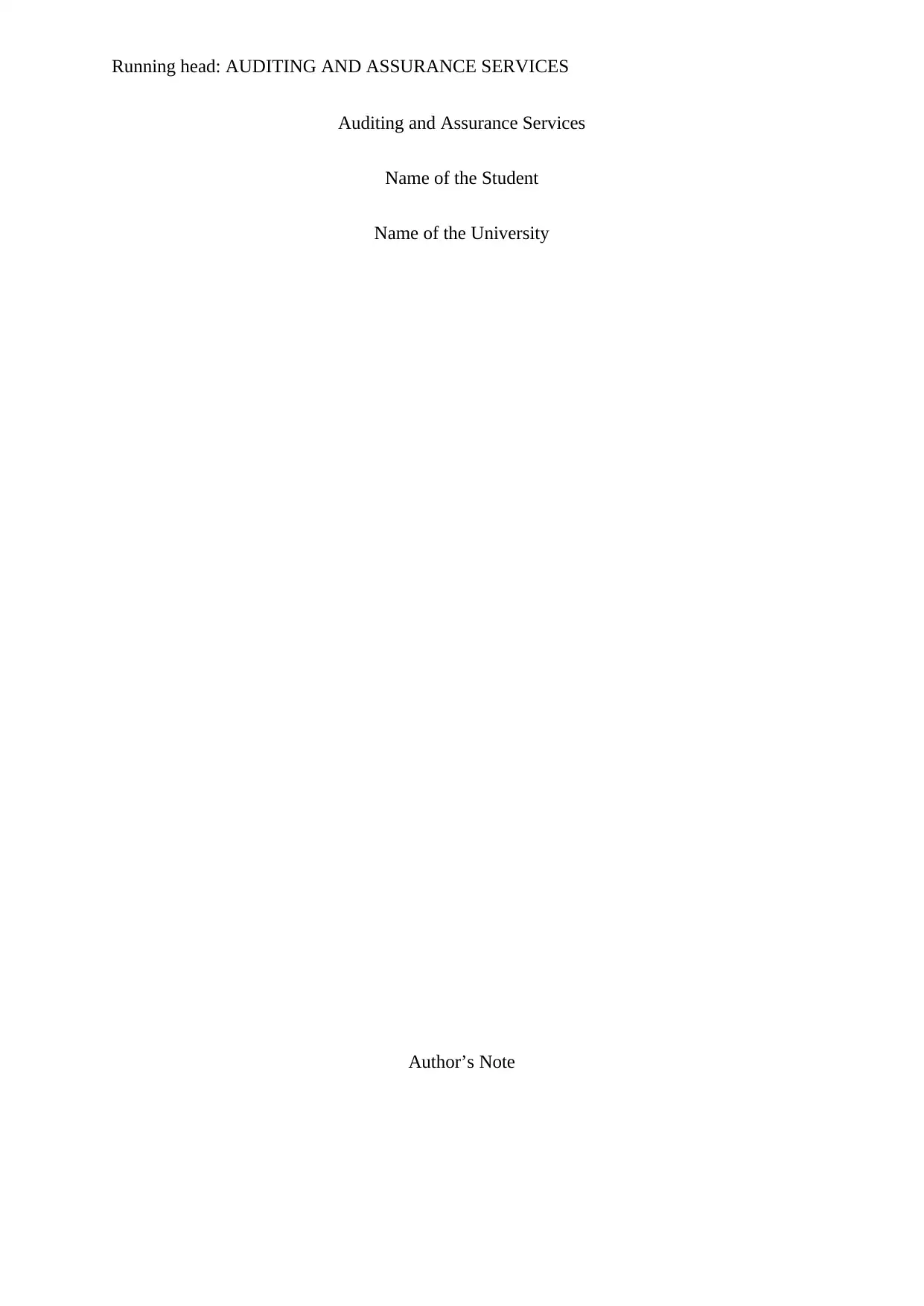
Running head: AUDITING AND ASSURANCE SERVICES
Auditing and Assurance Services
Name of the Student
Name of the University
Author’s Note
Auditing and Assurance Services
Name of the Student
Name of the University
Author’s Note
Paraphrase This Document
Need a fresh take? Get an instant paraphrase of this document with our AI Paraphraser
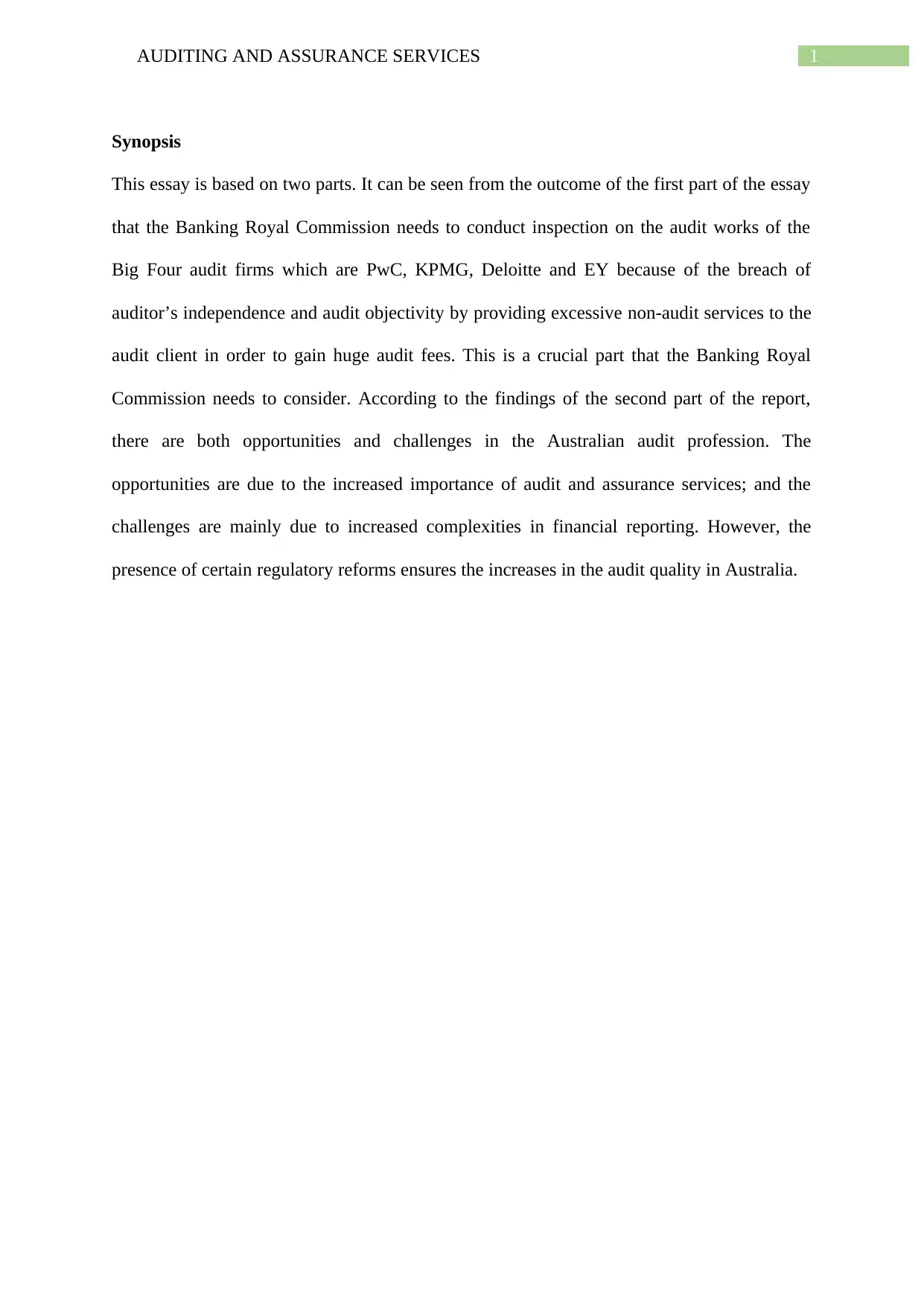
1AUDITING AND ASSURANCE SERVICES
Synopsis
This essay is based on two parts. It can be seen from the outcome of the first part of the essay
that the Banking Royal Commission needs to conduct inspection on the audit works of the
Big Four audit firms which are PwC, KPMG, Deloitte and EY because of the breach of
auditor’s independence and audit objectivity by providing excessive non-audit services to the
audit client in order to gain huge audit fees. This is a crucial part that the Banking Royal
Commission needs to consider. According to the findings of the second part of the report,
there are both opportunities and challenges in the Australian audit profession. The
opportunities are due to the increased importance of audit and assurance services; and the
challenges are mainly due to increased complexities in financial reporting. However, the
presence of certain regulatory reforms ensures the increases in the audit quality in Australia.
Synopsis
This essay is based on two parts. It can be seen from the outcome of the first part of the essay
that the Banking Royal Commission needs to conduct inspection on the audit works of the
Big Four audit firms which are PwC, KPMG, Deloitte and EY because of the breach of
auditor’s independence and audit objectivity by providing excessive non-audit services to the
audit client in order to gain huge audit fees. This is a crucial part that the Banking Royal
Commission needs to consider. According to the findings of the second part of the report,
there are both opportunities and challenges in the Australian audit profession. The
opportunities are due to the increased importance of audit and assurance services; and the
challenges are mainly due to increased complexities in financial reporting. However, the
presence of certain regulatory reforms ensures the increases in the audit quality in Australia.
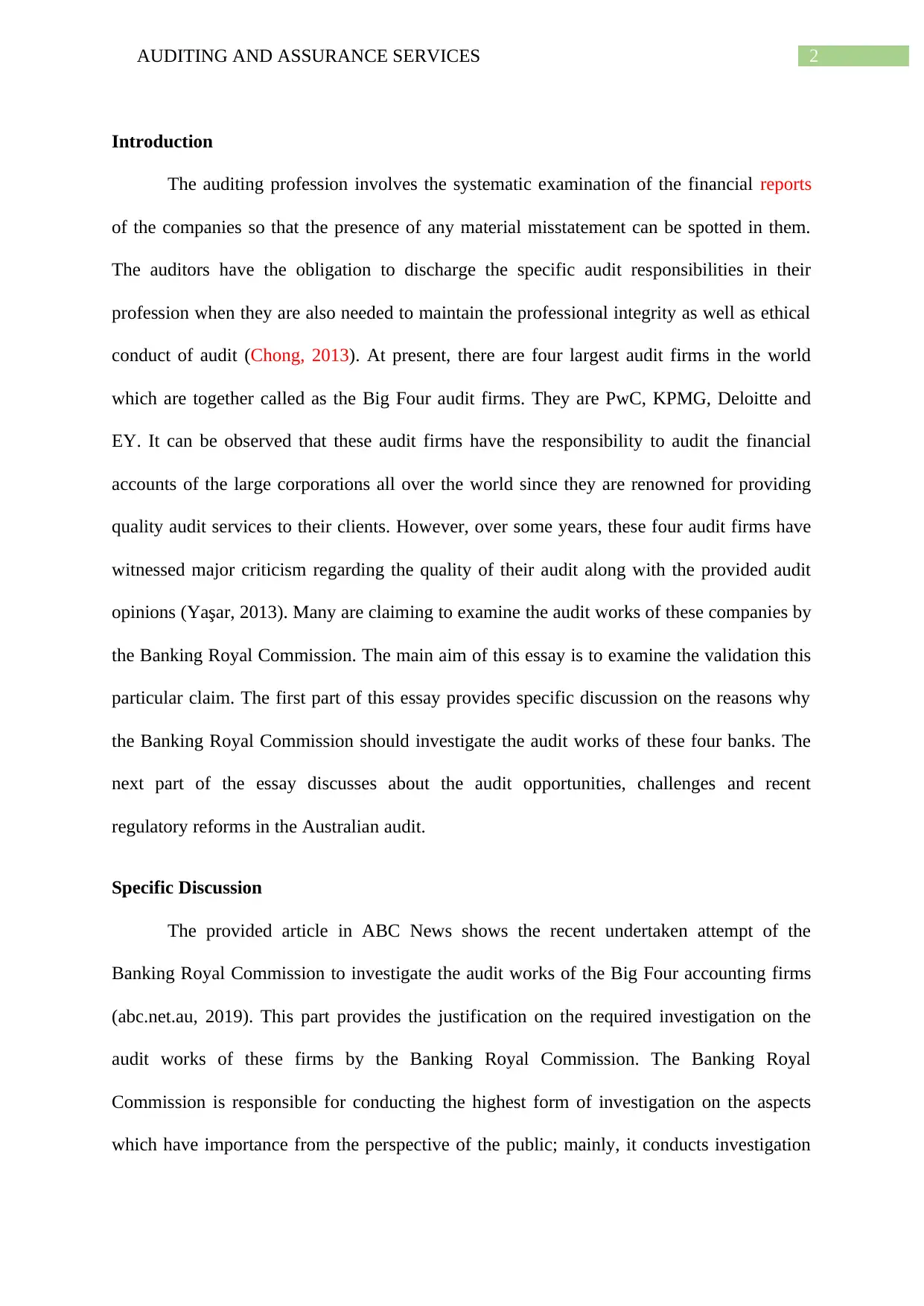
2AUDITING AND ASSURANCE SERVICES
Introduction
The auditing profession involves the systematic examination of the financial reports
of the companies so that the presence of any material misstatement can be spotted in them.
The auditors have the obligation to discharge the specific audit responsibilities in their
profession when they are also needed to maintain the professional integrity as well as ethical
conduct of audit (Chong, 2013). At present, there are four largest audit firms in the world
which are together called as the Big Four audit firms. They are PwC, KPMG, Deloitte and
EY. It can be observed that these audit firms have the responsibility to audit the financial
accounts of the large corporations all over the world since they are renowned for providing
quality audit services to their clients. However, over some years, these four audit firms have
witnessed major criticism regarding the quality of their audit along with the provided audit
opinions (Yaşar, 2013). Many are claiming to examine the audit works of these companies by
the Banking Royal Commission. The main aim of this essay is to examine the validation this
particular claim. The first part of this essay provides specific discussion on the reasons why
the Banking Royal Commission should investigate the audit works of these four banks. The
next part of the essay discusses about the audit opportunities, challenges and recent
regulatory reforms in the Australian audit.
Specific Discussion
The provided article in ABC News shows the recent undertaken attempt of the
Banking Royal Commission to investigate the audit works of the Big Four accounting firms
(abc.net.au, 2019). This part provides the justification on the required investigation on the
audit works of these firms by the Banking Royal Commission. The Banking Royal
Commission is responsible for conducting the highest form of investigation on the aspects
which have importance from the perspective of the public; mainly, it conducts investigation
Introduction
The auditing profession involves the systematic examination of the financial reports
of the companies so that the presence of any material misstatement can be spotted in them.
The auditors have the obligation to discharge the specific audit responsibilities in their
profession when they are also needed to maintain the professional integrity as well as ethical
conduct of audit (Chong, 2013). At present, there are four largest audit firms in the world
which are together called as the Big Four audit firms. They are PwC, KPMG, Deloitte and
EY. It can be observed that these audit firms have the responsibility to audit the financial
accounts of the large corporations all over the world since they are renowned for providing
quality audit services to their clients. However, over some years, these four audit firms have
witnessed major criticism regarding the quality of their audit along with the provided audit
opinions (Yaşar, 2013). Many are claiming to examine the audit works of these companies by
the Banking Royal Commission. The main aim of this essay is to examine the validation this
particular claim. The first part of this essay provides specific discussion on the reasons why
the Banking Royal Commission should investigate the audit works of these four banks. The
next part of the essay discusses about the audit opportunities, challenges and recent
regulatory reforms in the Australian audit.
Specific Discussion
The provided article in ABC News shows the recent undertaken attempt of the
Banking Royal Commission to investigate the audit works of the Big Four accounting firms
(abc.net.au, 2019). This part provides the justification on the required investigation on the
audit works of these firms by the Banking Royal Commission. The Banking Royal
Commission is responsible for conducting the highest form of investigation on the aspects
which have importance from the perspective of the public; mainly, it conducts investigation
⊘ This is a preview!⊘
Do you want full access?
Subscribe today to unlock all pages.

Trusted by 1+ million students worldwide
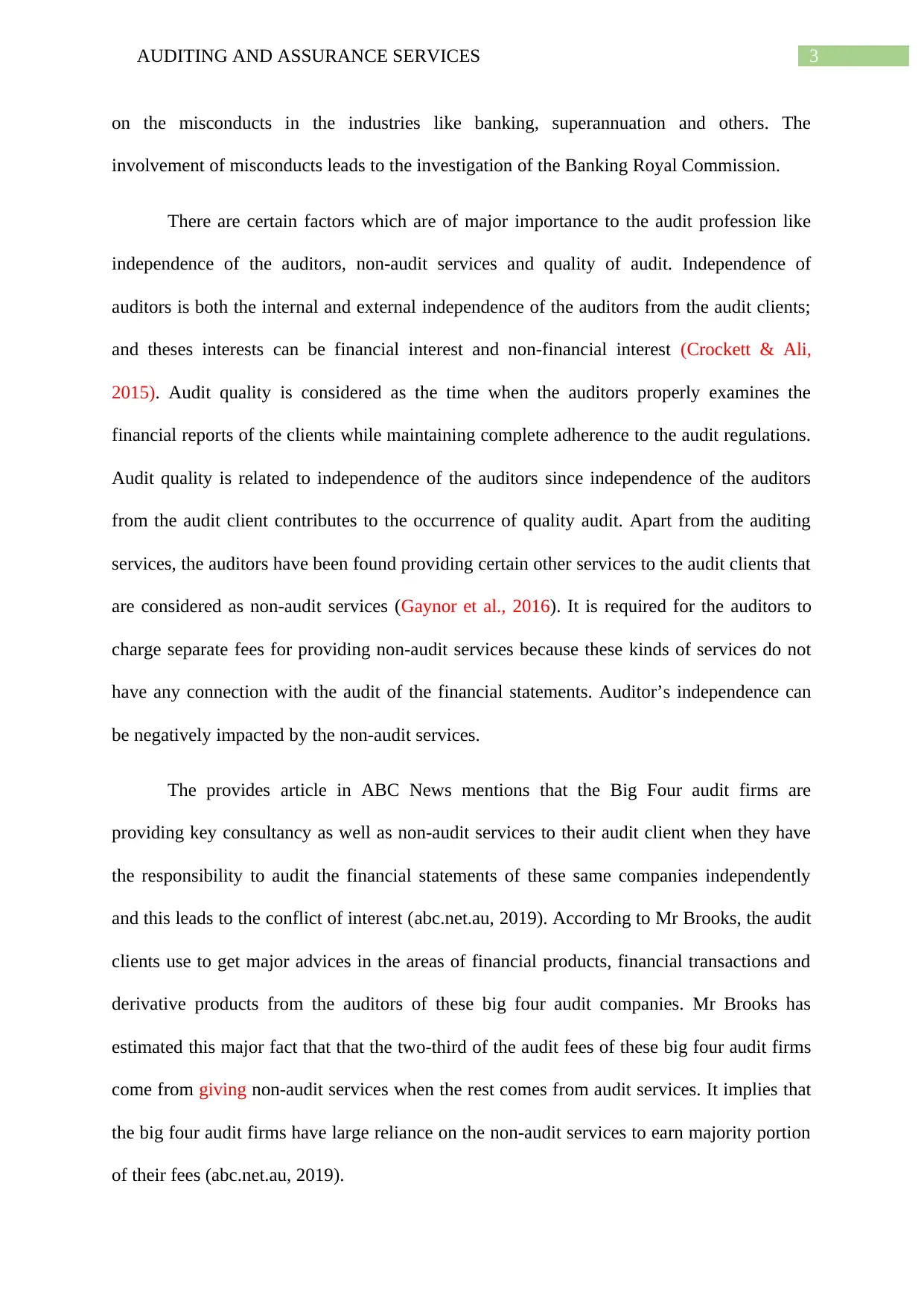
3AUDITING AND ASSURANCE SERVICES
on the misconducts in the industries like banking, superannuation and others. The
involvement of misconducts leads to the investigation of the Banking Royal Commission.
There are certain factors which are of major importance to the audit profession like
independence of the auditors, non-audit services and quality of audit. Independence of
auditors is both the internal and external independence of the auditors from the audit clients;
and theses interests can be financial interest and non-financial interest (Crockett & Ali,
2015). Audit quality is considered as the time when the auditors properly examines the
financial reports of the clients while maintaining complete adherence to the audit regulations.
Audit quality is related to independence of the auditors since independence of the auditors
from the audit client contributes to the occurrence of quality audit. Apart from the auditing
services, the auditors have been found providing certain other services to the audit clients that
are considered as non-audit services (Gaynor et al., 2016). It is required for the auditors to
charge separate fees for providing non-audit services because these kinds of services do not
have any connection with the audit of the financial statements. Auditor’s independence can
be negatively impacted by the non-audit services.
The provides article in ABC News mentions that the Big Four audit firms are
providing key consultancy as well as non-audit services to their audit client when they have
the responsibility to audit the financial statements of these same companies independently
and this leads to the conflict of interest (abc.net.au, 2019). According to Mr Brooks, the audit
clients use to get major advices in the areas of financial products, financial transactions and
derivative products from the auditors of these big four audit companies. Mr Brooks has
estimated this major fact that that the two-third of the audit fees of these big four audit firms
come from giving non-audit services when the rest comes from audit services. It implies that
the big four audit firms have large reliance on the non-audit services to earn majority portion
of their fees (abc.net.au, 2019).
on the misconducts in the industries like banking, superannuation and others. The
involvement of misconducts leads to the investigation of the Banking Royal Commission.
There are certain factors which are of major importance to the audit profession like
independence of the auditors, non-audit services and quality of audit. Independence of
auditors is both the internal and external independence of the auditors from the audit clients;
and theses interests can be financial interest and non-financial interest (Crockett & Ali,
2015). Audit quality is considered as the time when the auditors properly examines the
financial reports of the clients while maintaining complete adherence to the audit regulations.
Audit quality is related to independence of the auditors since independence of the auditors
from the audit client contributes to the occurrence of quality audit. Apart from the auditing
services, the auditors have been found providing certain other services to the audit clients that
are considered as non-audit services (Gaynor et al., 2016). It is required for the auditors to
charge separate fees for providing non-audit services because these kinds of services do not
have any connection with the audit of the financial statements. Auditor’s independence can
be negatively impacted by the non-audit services.
The provides article in ABC News mentions that the Big Four audit firms are
providing key consultancy as well as non-audit services to their audit client when they have
the responsibility to audit the financial statements of these same companies independently
and this leads to the conflict of interest (abc.net.au, 2019). According to Mr Brooks, the audit
clients use to get major advices in the areas of financial products, financial transactions and
derivative products from the auditors of these big four audit companies. Mr Brooks has
estimated this major fact that that the two-third of the audit fees of these big four audit firms
come from giving non-audit services when the rest comes from audit services. It implies that
the big four audit firms have large reliance on the non-audit services to earn majority portion
of their fees (abc.net.au, 2019).
Paraphrase This Document
Need a fresh take? Get an instant paraphrase of this document with our AI Paraphraser
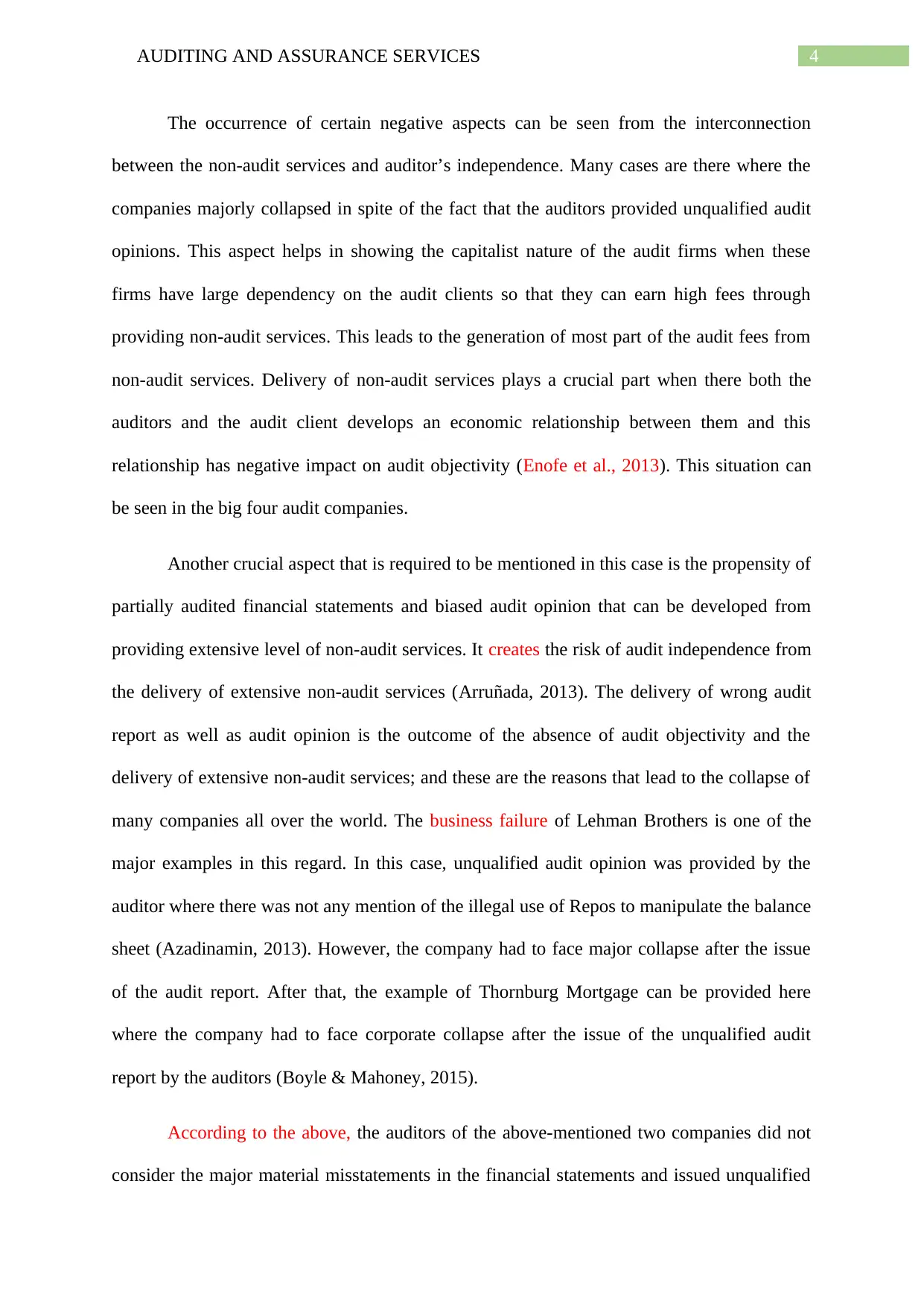
4AUDITING AND ASSURANCE SERVICES
The occurrence of certain negative aspects can be seen from the interconnection
between the non-audit services and auditor’s independence. Many cases are there where the
companies majorly collapsed in spite of the fact that the auditors provided unqualified audit
opinions. This aspect helps in showing the capitalist nature of the audit firms when these
firms have large dependency on the audit clients so that they can earn high fees through
providing non-audit services. This leads to the generation of most part of the audit fees from
non-audit services. Delivery of non-audit services plays a crucial part when there both the
auditors and the audit client develops an economic relationship between them and this
relationship has negative impact on audit objectivity (Enofe et al., 2013). This situation can
be seen in the big four audit companies.
Another crucial aspect that is required to be mentioned in this case is the propensity of
partially audited financial statements and biased audit opinion that can be developed from
providing extensive level of non-audit services. It creates the risk of audit independence from
the delivery of extensive non-audit services (Arruñada, 2013). The delivery of wrong audit
report as well as audit opinion is the outcome of the absence of audit objectivity and the
delivery of extensive non-audit services; and these are the reasons that lead to the collapse of
many companies all over the world. The business failure of Lehman Brothers is one of the
major examples in this regard. In this case, unqualified audit opinion was provided by the
auditor where there was not any mention of the illegal use of Repos to manipulate the balance
sheet (Azadinamin, 2013). However, the company had to face major collapse after the issue
of the audit report. After that, the example of Thornburg Mortgage can be provided here
where the company had to face corporate collapse after the issue of the unqualified audit
report by the auditors (Boyle & Mahoney, 2015).
According to the above, the auditors of the above-mentioned two companies did not
consider the major material misstatements in the financial statements and issued unqualified
The occurrence of certain negative aspects can be seen from the interconnection
between the non-audit services and auditor’s independence. Many cases are there where the
companies majorly collapsed in spite of the fact that the auditors provided unqualified audit
opinions. This aspect helps in showing the capitalist nature of the audit firms when these
firms have large dependency on the audit clients so that they can earn high fees through
providing non-audit services. This leads to the generation of most part of the audit fees from
non-audit services. Delivery of non-audit services plays a crucial part when there both the
auditors and the audit client develops an economic relationship between them and this
relationship has negative impact on audit objectivity (Enofe et al., 2013). This situation can
be seen in the big four audit companies.
Another crucial aspect that is required to be mentioned in this case is the propensity of
partially audited financial statements and biased audit opinion that can be developed from
providing extensive level of non-audit services. It creates the risk of audit independence from
the delivery of extensive non-audit services (Arruñada, 2013). The delivery of wrong audit
report as well as audit opinion is the outcome of the absence of audit objectivity and the
delivery of extensive non-audit services; and these are the reasons that lead to the collapse of
many companies all over the world. The business failure of Lehman Brothers is one of the
major examples in this regard. In this case, unqualified audit opinion was provided by the
auditor where there was not any mention of the illegal use of Repos to manipulate the balance
sheet (Azadinamin, 2013). However, the company had to face major collapse after the issue
of the audit report. After that, the example of Thornburg Mortgage can be provided here
where the company had to face corporate collapse after the issue of the unqualified audit
report by the auditors (Boyle & Mahoney, 2015).
According to the above, the auditors of the above-mentioned two companies did not
consider the major material misstatements in the financial statements and issued unqualified
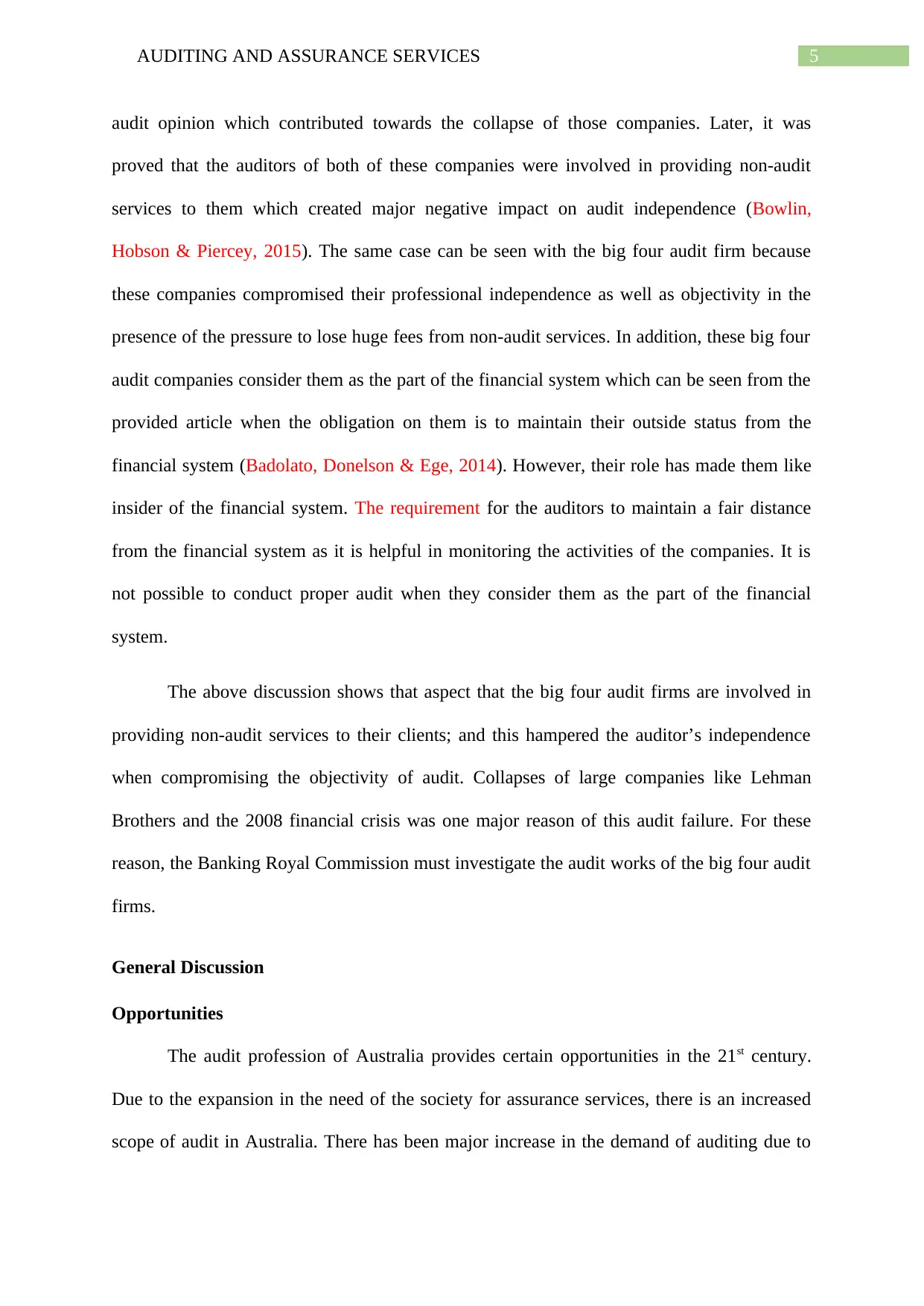
5AUDITING AND ASSURANCE SERVICES
audit opinion which contributed towards the collapse of those companies. Later, it was
proved that the auditors of both of these companies were involved in providing non-audit
services to them which created major negative impact on audit independence (Bowlin,
Hobson & Piercey, 2015). The same case can be seen with the big four audit firm because
these companies compromised their professional independence as well as objectivity in the
presence of the pressure to lose huge fees from non-audit services. In addition, these big four
audit companies consider them as the part of the financial system which can be seen from the
provided article when the obligation on them is to maintain their outside status from the
financial system (Badolato, Donelson & Ege, 2014). However, their role has made them like
insider of the financial system. The requirement for the auditors to maintain a fair distance
from the financial system as it is helpful in monitoring the activities of the companies. It is
not possible to conduct proper audit when they consider them as the part of the financial
system.
The above discussion shows that aspect that the big four audit firms are involved in
providing non-audit services to their clients; and this hampered the auditor’s independence
when compromising the objectivity of audit. Collapses of large companies like Lehman
Brothers and the 2008 financial crisis was one major reason of this audit failure. For these
reason, the Banking Royal Commission must investigate the audit works of the big four audit
firms.
General Discussion
Opportunities
The audit profession of Australia provides certain opportunities in the 21st century.
Due to the expansion in the need of the society for assurance services, there is an increased
scope of audit in Australia. There has been major increase in the demand of auditing due to
audit opinion which contributed towards the collapse of those companies. Later, it was
proved that the auditors of both of these companies were involved in providing non-audit
services to them which created major negative impact on audit independence (Bowlin,
Hobson & Piercey, 2015). The same case can be seen with the big four audit firm because
these companies compromised their professional independence as well as objectivity in the
presence of the pressure to lose huge fees from non-audit services. In addition, these big four
audit companies consider them as the part of the financial system which can be seen from the
provided article when the obligation on them is to maintain their outside status from the
financial system (Badolato, Donelson & Ege, 2014). However, their role has made them like
insider of the financial system. The requirement for the auditors to maintain a fair distance
from the financial system as it is helpful in monitoring the activities of the companies. It is
not possible to conduct proper audit when they consider them as the part of the financial
system.
The above discussion shows that aspect that the big four audit firms are involved in
providing non-audit services to their clients; and this hampered the auditor’s independence
when compromising the objectivity of audit. Collapses of large companies like Lehman
Brothers and the 2008 financial crisis was one major reason of this audit failure. For these
reason, the Banking Royal Commission must investigate the audit works of the big four audit
firms.
General Discussion
Opportunities
The audit profession of Australia provides certain opportunities in the 21st century.
Due to the expansion in the need of the society for assurance services, there is an increased
scope of audit in Australia. There has been major increase in the demand of auditing due to
⊘ This is a preview!⊘
Do you want full access?
Subscribe today to unlock all pages.

Trusted by 1+ million students worldwide
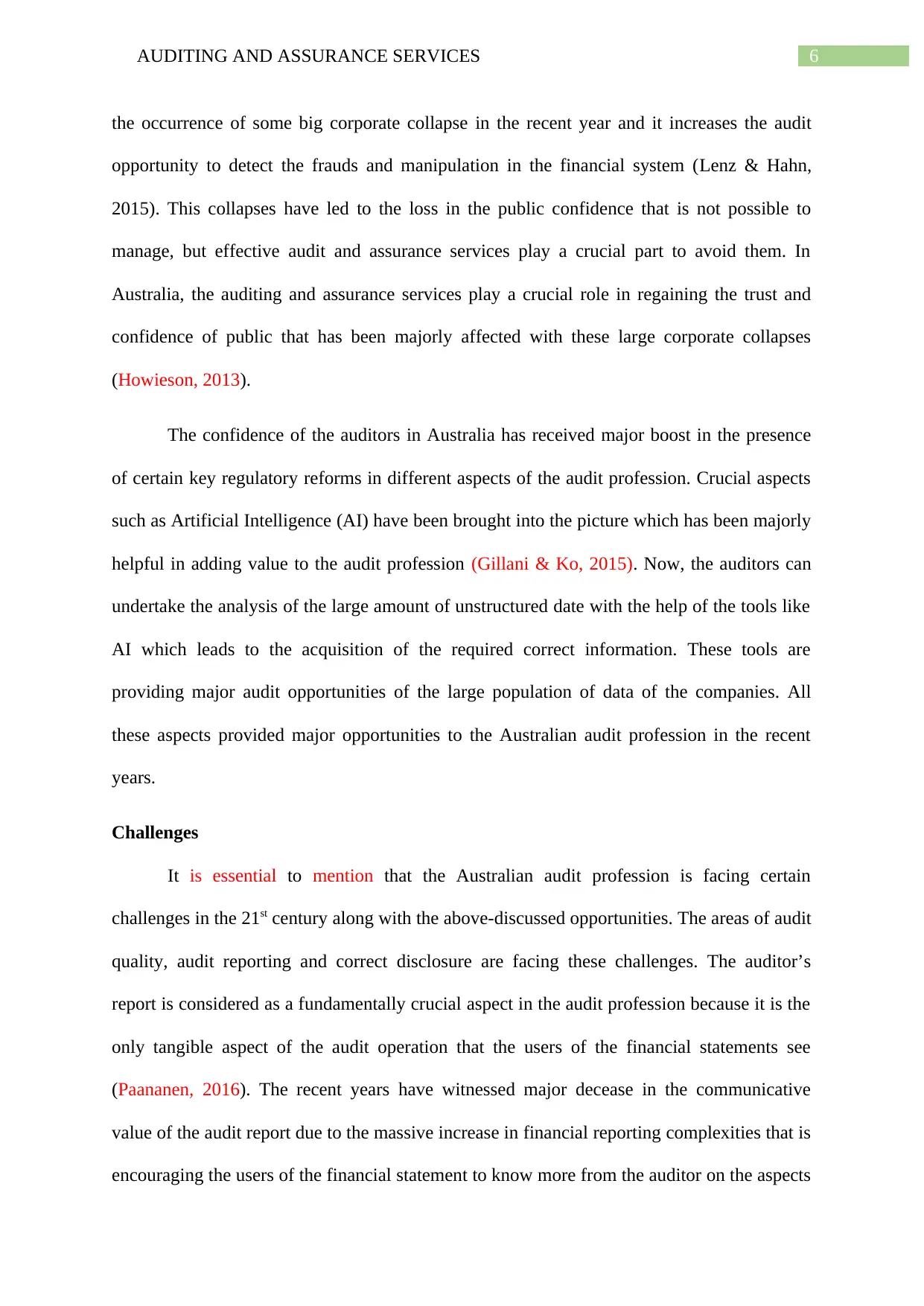
6AUDITING AND ASSURANCE SERVICES
the occurrence of some big corporate collapse in the recent year and it increases the audit
opportunity to detect the frauds and manipulation in the financial system (Lenz & Hahn,
2015). This collapses have led to the loss in the public confidence that is not possible to
manage, but effective audit and assurance services play a crucial part to avoid them. In
Australia, the auditing and assurance services play a crucial role in regaining the trust and
confidence of public that has been majorly affected with these large corporate collapses
(Howieson, 2013).
The confidence of the auditors in Australia has received major boost in the presence
of certain key regulatory reforms in different aspects of the audit profession. Crucial aspects
such as Artificial Intelligence (AI) have been brought into the picture which has been majorly
helpful in adding value to the audit profession (Gillani & Ko, 2015). Now, the auditors can
undertake the analysis of the large amount of unstructured date with the help of the tools like
AI which leads to the acquisition of the required correct information. These tools are
providing major audit opportunities of the large population of data of the companies. All
these aspects provided major opportunities to the Australian audit profession in the recent
years.
Challenges
It is essential to mention that the Australian audit profession is facing certain
challenges in the 21st century along with the above-discussed opportunities. The areas of audit
quality, audit reporting and correct disclosure are facing these challenges. The auditor’s
report is considered as a fundamentally crucial aspect in the audit profession because it is the
only tangible aspect of the audit operation that the users of the financial statements see
(Paananen, 2016). The recent years have witnessed major decease in the communicative
value of the audit report due to the massive increase in financial reporting complexities that is
encouraging the users of the financial statement to know more from the auditor on the aspects
the occurrence of some big corporate collapse in the recent year and it increases the audit
opportunity to detect the frauds and manipulation in the financial system (Lenz & Hahn,
2015). This collapses have led to the loss in the public confidence that is not possible to
manage, but effective audit and assurance services play a crucial part to avoid them. In
Australia, the auditing and assurance services play a crucial role in regaining the trust and
confidence of public that has been majorly affected with these large corporate collapses
(Howieson, 2013).
The confidence of the auditors in Australia has received major boost in the presence
of certain key regulatory reforms in different aspects of the audit profession. Crucial aspects
such as Artificial Intelligence (AI) have been brought into the picture which has been majorly
helpful in adding value to the audit profession (Gillani & Ko, 2015). Now, the auditors can
undertake the analysis of the large amount of unstructured date with the help of the tools like
AI which leads to the acquisition of the required correct information. These tools are
providing major audit opportunities of the large population of data of the companies. All
these aspects provided major opportunities to the Australian audit profession in the recent
years.
Challenges
It is essential to mention that the Australian audit profession is facing certain
challenges in the 21st century along with the above-discussed opportunities. The areas of audit
quality, audit reporting and correct disclosure are facing these challenges. The auditor’s
report is considered as a fundamentally crucial aspect in the audit profession because it is the
only tangible aspect of the audit operation that the users of the financial statements see
(Paananen, 2016). The recent years have witnessed major decease in the communicative
value of the audit report due to the massive increase in financial reporting complexities that is
encouraging the users of the financial statement to know more from the auditor on the aspects
Paraphrase This Document
Need a fresh take? Get an instant paraphrase of this document with our AI Paraphraser
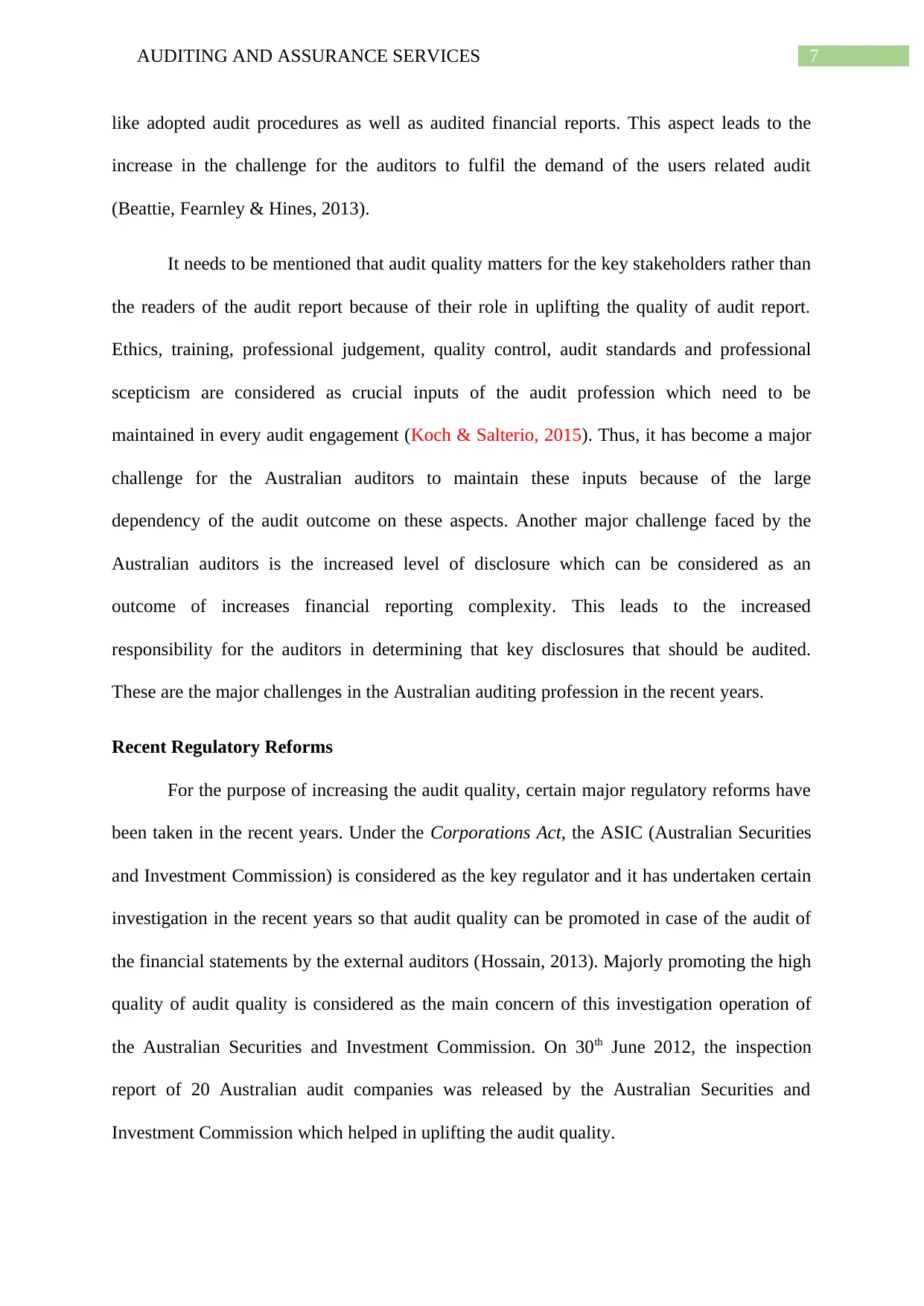
7AUDITING AND ASSURANCE SERVICES
like adopted audit procedures as well as audited financial reports. This aspect leads to the
increase in the challenge for the auditors to fulfil the demand of the users related audit
(Beattie, Fearnley & Hines, 2013).
It needs to be mentioned that audit quality matters for the key stakeholders rather than
the readers of the audit report because of their role in uplifting the quality of audit report.
Ethics, training, professional judgement, quality control, audit standards and professional
scepticism are considered as crucial inputs of the audit profession which need to be
maintained in every audit engagement (Koch & Salterio, 2015). Thus, it has become a major
challenge for the Australian auditors to maintain these inputs because of the large
dependency of the audit outcome on these aspects. Another major challenge faced by the
Australian auditors is the increased level of disclosure which can be considered as an
outcome of increases financial reporting complexity. This leads to the increased
responsibility for the auditors in determining that key disclosures that should be audited.
These are the major challenges in the Australian auditing profession in the recent years.
Recent Regulatory Reforms
For the purpose of increasing the audit quality, certain major regulatory reforms have
been taken in the recent years. Under the Corporations Act, the ASIC (Australian Securities
and Investment Commission) is considered as the key regulator and it has undertaken certain
investigation in the recent years so that audit quality can be promoted in case of the audit of
the financial statements by the external auditors (Hossain, 2013). Majorly promoting the high
quality of audit quality is considered as the main concern of this investigation operation of
the Australian Securities and Investment Commission. On 30th June 2012, the inspection
report of 20 Australian audit companies was released by the Australian Securities and
Investment Commission which helped in uplifting the audit quality.
like adopted audit procedures as well as audited financial reports. This aspect leads to the
increase in the challenge for the auditors to fulfil the demand of the users related audit
(Beattie, Fearnley & Hines, 2013).
It needs to be mentioned that audit quality matters for the key stakeholders rather than
the readers of the audit report because of their role in uplifting the quality of audit report.
Ethics, training, professional judgement, quality control, audit standards and professional
scepticism are considered as crucial inputs of the audit profession which need to be
maintained in every audit engagement (Koch & Salterio, 2015). Thus, it has become a major
challenge for the Australian auditors to maintain these inputs because of the large
dependency of the audit outcome on these aspects. Another major challenge faced by the
Australian auditors is the increased level of disclosure which can be considered as an
outcome of increases financial reporting complexity. This leads to the increased
responsibility for the auditors in determining that key disclosures that should be audited.
These are the major challenges in the Australian auditing profession in the recent years.
Recent Regulatory Reforms
For the purpose of increasing the audit quality, certain major regulatory reforms have
been taken in the recent years. Under the Corporations Act, the ASIC (Australian Securities
and Investment Commission) is considered as the key regulator and it has undertaken certain
investigation in the recent years so that audit quality can be promoted in case of the audit of
the financial statements by the external auditors (Hossain, 2013). Majorly promoting the high
quality of audit quality is considered as the main concern of this investigation operation of
the Australian Securities and Investment Commission. On 30th June 2012, the inspection
report of 20 Australian audit companies was released by the Australian Securities and
Investment Commission which helped in uplifting the audit quality.
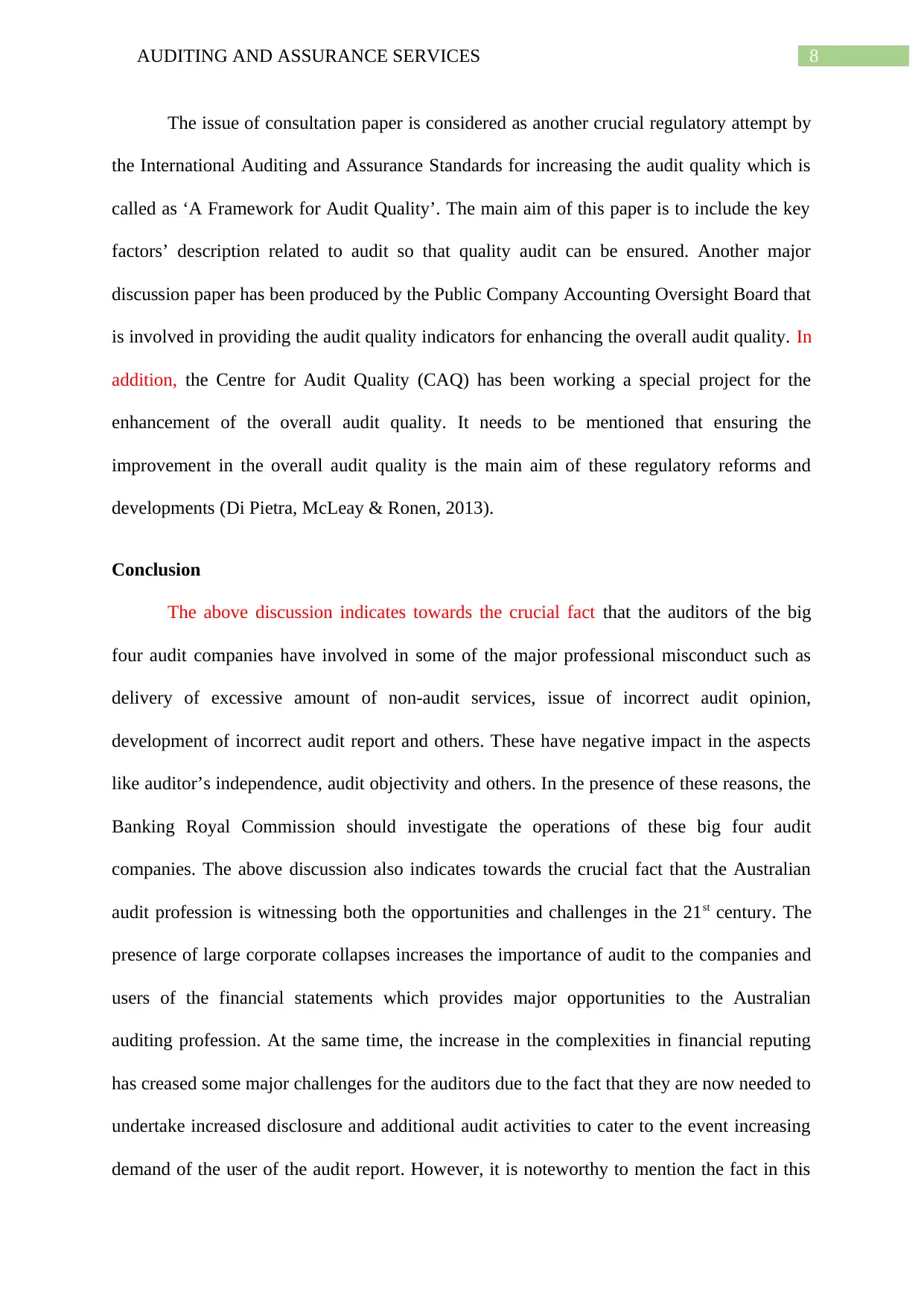
8AUDITING AND ASSURANCE SERVICES
The issue of consultation paper is considered as another crucial regulatory attempt by
the International Auditing and Assurance Standards for increasing the audit quality which is
called as ‘A Framework for Audit Quality’. The main aim of this paper is to include the key
factors’ description related to audit so that quality audit can be ensured. Another major
discussion paper has been produced by the Public Company Accounting Oversight Board that
is involved in providing the audit quality indicators for enhancing the overall audit quality. In
addition, the Centre for Audit Quality (CAQ) has been working a special project for the
enhancement of the overall audit quality. It needs to be mentioned that ensuring the
improvement in the overall audit quality is the main aim of these regulatory reforms and
developments (Di Pietra, McLeay & Ronen, 2013).
Conclusion
The above discussion indicates towards the crucial fact that the auditors of the big
four audit companies have involved in some of the major professional misconduct such as
delivery of excessive amount of non-audit services, issue of incorrect audit opinion,
development of incorrect audit report and others. These have negative impact in the aspects
like auditor’s independence, audit objectivity and others. In the presence of these reasons, the
Banking Royal Commission should investigate the operations of these big four audit
companies. The above discussion also indicates towards the crucial fact that the Australian
audit profession is witnessing both the opportunities and challenges in the 21st century. The
presence of large corporate collapses increases the importance of audit to the companies and
users of the financial statements which provides major opportunities to the Australian
auditing profession. At the same time, the increase in the complexities in financial reputing
has creased some major challenges for the auditors due to the fact that they are now needed to
undertake increased disclosure and additional audit activities to cater to the event increasing
demand of the user of the audit report. However, it is noteworthy to mention the fact in this
The issue of consultation paper is considered as another crucial regulatory attempt by
the International Auditing and Assurance Standards for increasing the audit quality which is
called as ‘A Framework for Audit Quality’. The main aim of this paper is to include the key
factors’ description related to audit so that quality audit can be ensured. Another major
discussion paper has been produced by the Public Company Accounting Oversight Board that
is involved in providing the audit quality indicators for enhancing the overall audit quality. In
addition, the Centre for Audit Quality (CAQ) has been working a special project for the
enhancement of the overall audit quality. It needs to be mentioned that ensuring the
improvement in the overall audit quality is the main aim of these regulatory reforms and
developments (Di Pietra, McLeay & Ronen, 2013).
Conclusion
The above discussion indicates towards the crucial fact that the auditors of the big
four audit companies have involved in some of the major professional misconduct such as
delivery of excessive amount of non-audit services, issue of incorrect audit opinion,
development of incorrect audit report and others. These have negative impact in the aspects
like auditor’s independence, audit objectivity and others. In the presence of these reasons, the
Banking Royal Commission should investigate the operations of these big four audit
companies. The above discussion also indicates towards the crucial fact that the Australian
audit profession is witnessing both the opportunities and challenges in the 21st century. The
presence of large corporate collapses increases the importance of audit to the companies and
users of the financial statements which provides major opportunities to the Australian
auditing profession. At the same time, the increase in the complexities in financial reputing
has creased some major challenges for the auditors due to the fact that they are now needed to
undertake increased disclosure and additional audit activities to cater to the event increasing
demand of the user of the audit report. However, it is noteworthy to mention the fact in this
⊘ This is a preview!⊘
Do you want full access?
Subscribe today to unlock all pages.

Trusted by 1+ million students worldwide
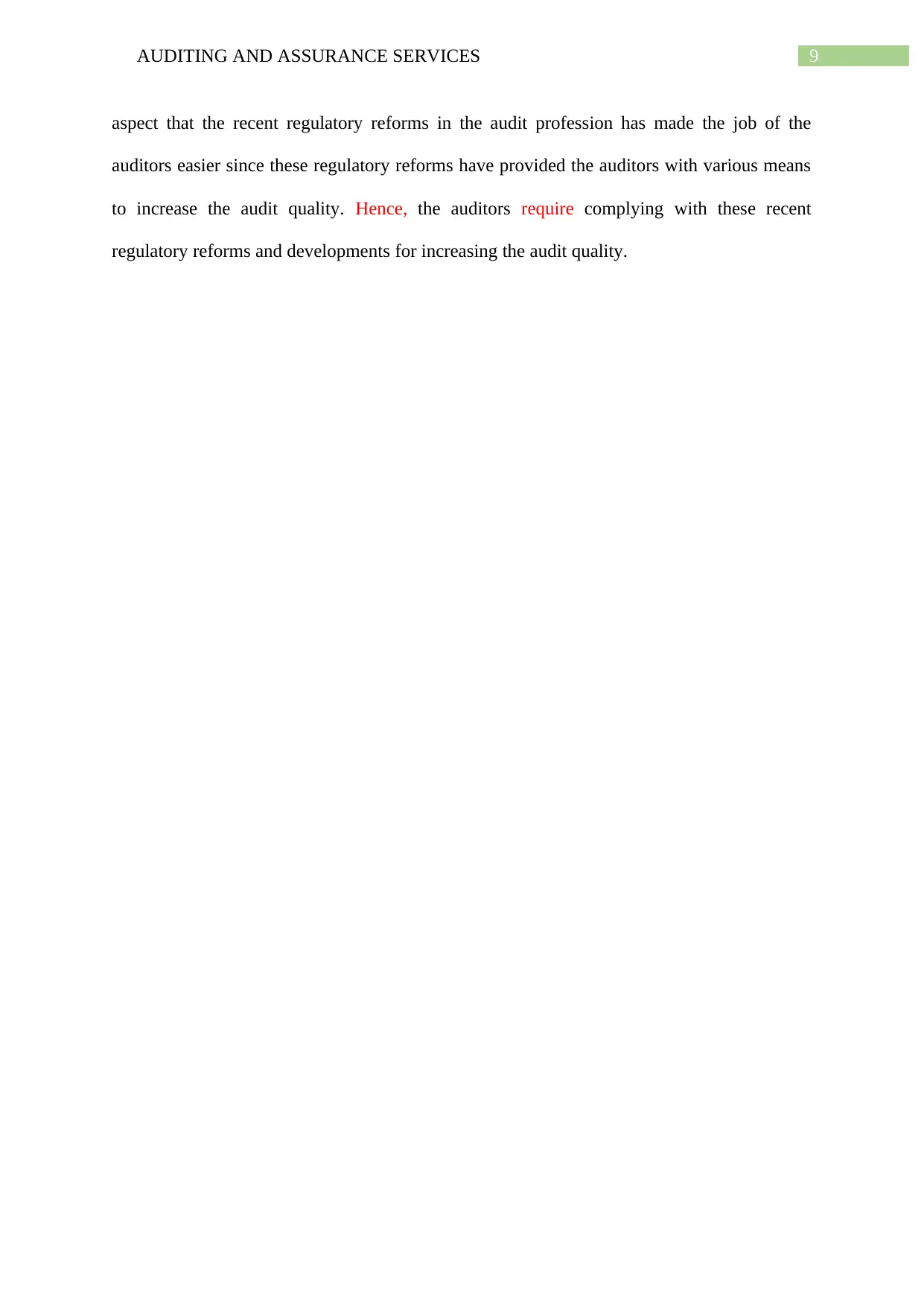
9AUDITING AND ASSURANCE SERVICES
aspect that the recent regulatory reforms in the audit profession has made the job of the
auditors easier since these regulatory reforms have provided the auditors with various means
to increase the audit quality. Hence, the auditors require complying with these recent
regulatory reforms and developments for increasing the audit quality.
aspect that the recent regulatory reforms in the audit profession has made the job of the
auditors easier since these regulatory reforms have provided the auditors with various means
to increase the audit quality. Hence, the auditors require complying with these recent
regulatory reforms and developments for increasing the audit quality.
Paraphrase This Document
Need a fresh take? Get an instant paraphrase of this document with our AI Paraphraser
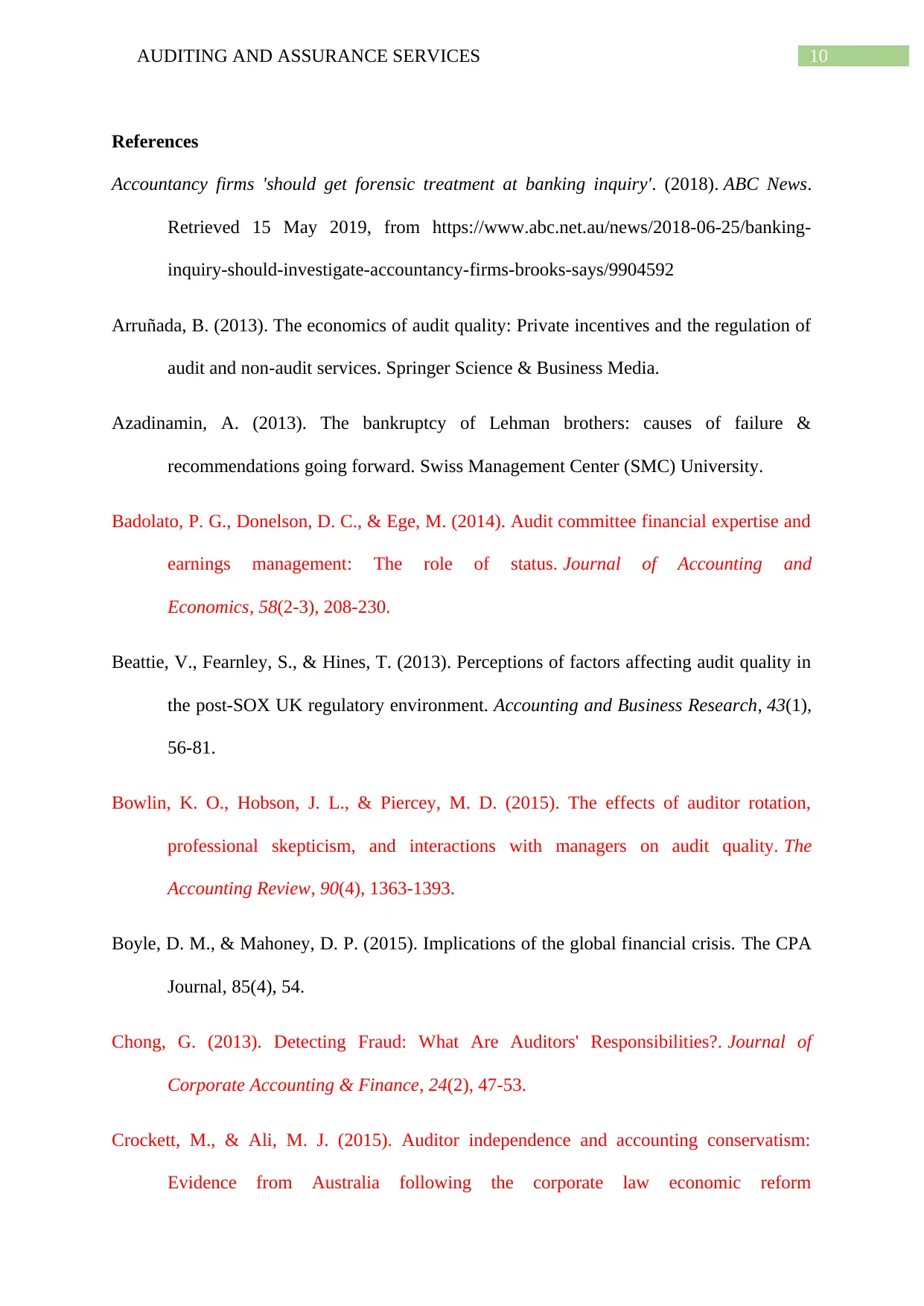
10AUDITING AND ASSURANCE SERVICES
References
Accountancy firms 'should get forensic treatment at banking inquiry'. (2018). ABC News.
Retrieved 15 May 2019, from https://www.abc.net.au/news/2018-06-25/banking-
inquiry-should-investigate-accountancy-firms-brooks-says/9904592
Arruñada, B. (2013). The economics of audit quality: Private incentives and the regulation of
audit and non-audit services. Springer Science & Business Media.
Azadinamin, A. (2013). The bankruptcy of Lehman brothers: causes of failure &
recommendations going forward. Swiss Management Center (SMC) University.
Badolato, P. G., Donelson, D. C., & Ege, M. (2014). Audit committee financial expertise and
earnings management: The role of status. Journal of Accounting and
Economics, 58(2-3), 208-230.
Beattie, V., Fearnley, S., & Hines, T. (2013). Perceptions of factors affecting audit quality in
the post-SOX UK regulatory environment. Accounting and Business Research, 43(1),
56-81.
Bowlin, K. O., Hobson, J. L., & Piercey, M. D. (2015). The effects of auditor rotation,
professional skepticism, and interactions with managers on audit quality. The
Accounting Review, 90(4), 1363-1393.
Boyle, D. M., & Mahoney, D. P. (2015). Implications of the global financial crisis. The CPA
Journal, 85(4), 54.
Chong, G. (2013). Detecting Fraud: What Are Auditors' Responsibilities?. Journal of
Corporate Accounting & Finance, 24(2), 47-53.
Crockett, M., & Ali, M. J. (2015). Auditor independence and accounting conservatism:
Evidence from Australia following the corporate law economic reform
References
Accountancy firms 'should get forensic treatment at banking inquiry'. (2018). ABC News.
Retrieved 15 May 2019, from https://www.abc.net.au/news/2018-06-25/banking-
inquiry-should-investigate-accountancy-firms-brooks-says/9904592
Arruñada, B. (2013). The economics of audit quality: Private incentives and the regulation of
audit and non-audit services. Springer Science & Business Media.
Azadinamin, A. (2013). The bankruptcy of Lehman brothers: causes of failure &
recommendations going forward. Swiss Management Center (SMC) University.
Badolato, P. G., Donelson, D. C., & Ege, M. (2014). Audit committee financial expertise and
earnings management: The role of status. Journal of Accounting and
Economics, 58(2-3), 208-230.
Beattie, V., Fearnley, S., & Hines, T. (2013). Perceptions of factors affecting audit quality in
the post-SOX UK regulatory environment. Accounting and Business Research, 43(1),
56-81.
Bowlin, K. O., Hobson, J. L., & Piercey, M. D. (2015). The effects of auditor rotation,
professional skepticism, and interactions with managers on audit quality. The
Accounting Review, 90(4), 1363-1393.
Boyle, D. M., & Mahoney, D. P. (2015). Implications of the global financial crisis. The CPA
Journal, 85(4), 54.
Chong, G. (2013). Detecting Fraud: What Are Auditors' Responsibilities?. Journal of
Corporate Accounting & Finance, 24(2), 47-53.
Crockett, M., & Ali, M. J. (2015). Auditor independence and accounting conservatism:
Evidence from Australia following the corporate law economic reform
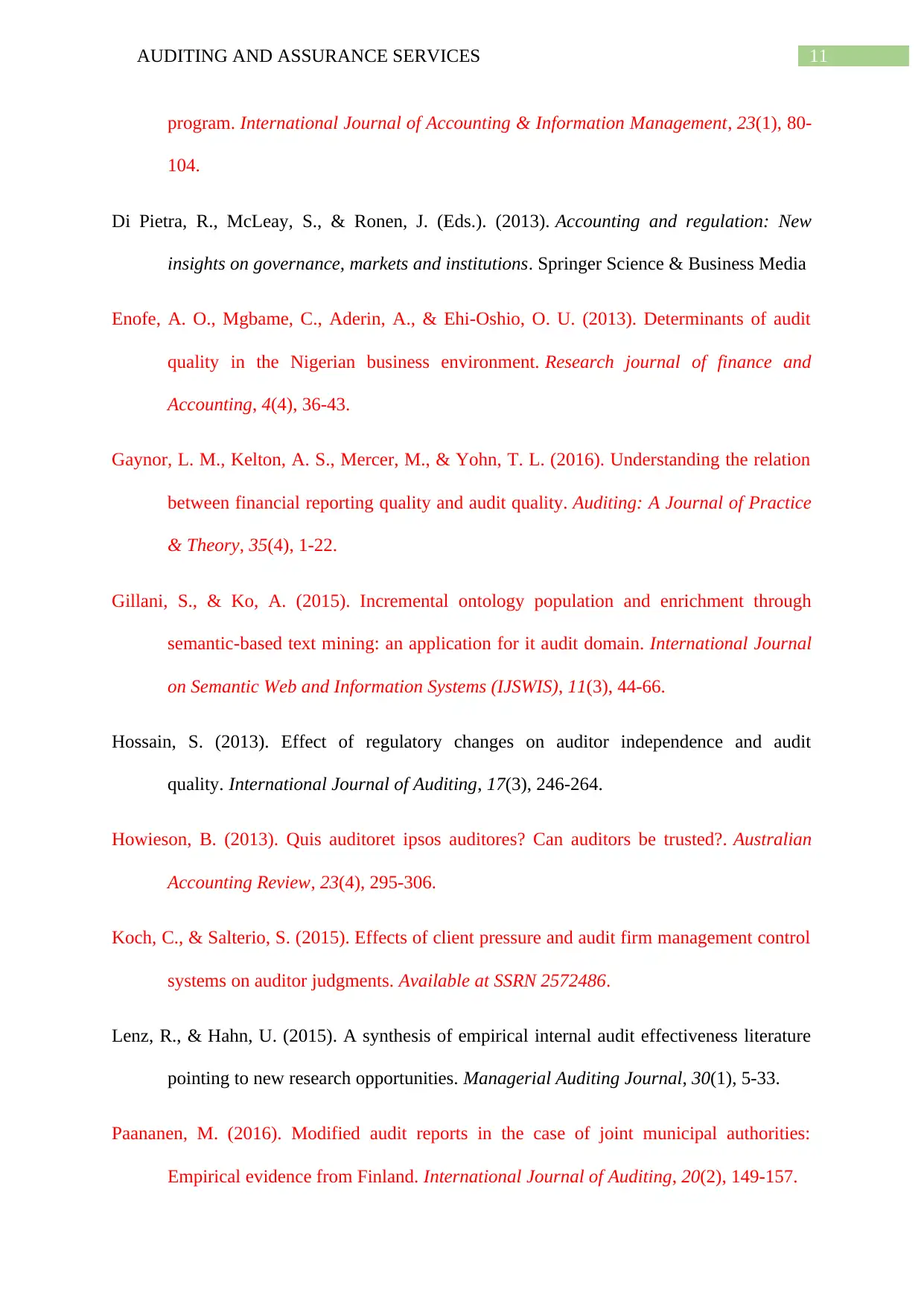
11AUDITING AND ASSURANCE SERVICES
program. International Journal of Accounting & Information Management, 23(1), 80-
104.
Di Pietra, R., McLeay, S., & Ronen, J. (Eds.). (2013). Accounting and regulation: New
insights on governance, markets and institutions. Springer Science & Business Media
Enofe, A. O., Mgbame, C., Aderin, A., & Ehi-Oshio, O. U. (2013). Determinants of audit
quality in the Nigerian business environment. Research journal of finance and
Accounting, 4(4), 36-43.
Gaynor, L. M., Kelton, A. S., Mercer, M., & Yohn, T. L. (2016). Understanding the relation
between financial reporting quality and audit quality. Auditing: A Journal of Practice
& Theory, 35(4), 1-22.
Gillani, S., & Ko, A. (2015). Incremental ontology population and enrichment through
semantic-based text mining: an application for it audit domain. International Journal
on Semantic Web and Information Systems (IJSWIS), 11(3), 44-66.
Hossain, S. (2013). Effect of regulatory changes on auditor independence and audit
quality. International Journal of Auditing, 17(3), 246-264.
Howieson, B. (2013). Quis auditoret ipsos auditores? Can auditors be trusted?. Australian
Accounting Review, 23(4), 295-306.
Koch, C., & Salterio, S. (2015). Effects of client pressure and audit firm management control
systems on auditor judgments. Available at SSRN 2572486.
Lenz, R., & Hahn, U. (2015). A synthesis of empirical internal audit effectiveness literature
pointing to new research opportunities. Managerial Auditing Journal, 30(1), 5-33.
Paananen, M. (2016). Modified audit reports in the case of joint municipal authorities:
Empirical evidence from Finland. International Journal of Auditing, 20(2), 149-157.
program. International Journal of Accounting & Information Management, 23(1), 80-
104.
Di Pietra, R., McLeay, S., & Ronen, J. (Eds.). (2013). Accounting and regulation: New
insights on governance, markets and institutions. Springer Science & Business Media
Enofe, A. O., Mgbame, C., Aderin, A., & Ehi-Oshio, O. U. (2013). Determinants of audit
quality in the Nigerian business environment. Research journal of finance and
Accounting, 4(4), 36-43.
Gaynor, L. M., Kelton, A. S., Mercer, M., & Yohn, T. L. (2016). Understanding the relation
between financial reporting quality and audit quality. Auditing: A Journal of Practice
& Theory, 35(4), 1-22.
Gillani, S., & Ko, A. (2015). Incremental ontology population and enrichment through
semantic-based text mining: an application for it audit domain. International Journal
on Semantic Web and Information Systems (IJSWIS), 11(3), 44-66.
Hossain, S. (2013). Effect of regulatory changes on auditor independence and audit
quality. International Journal of Auditing, 17(3), 246-264.
Howieson, B. (2013). Quis auditoret ipsos auditores? Can auditors be trusted?. Australian
Accounting Review, 23(4), 295-306.
Koch, C., & Salterio, S. (2015). Effects of client pressure and audit firm management control
systems on auditor judgments. Available at SSRN 2572486.
Lenz, R., & Hahn, U. (2015). A synthesis of empirical internal audit effectiveness literature
pointing to new research opportunities. Managerial Auditing Journal, 30(1), 5-33.
Paananen, M. (2016). Modified audit reports in the case of joint municipal authorities:
Empirical evidence from Finland. International Journal of Auditing, 20(2), 149-157.
⊘ This is a preview!⊘
Do you want full access?
Subscribe today to unlock all pages.

Trusted by 1+ million students worldwide
1 out of 13
Related Documents
Your All-in-One AI-Powered Toolkit for Academic Success.
+13062052269
info@desklib.com
Available 24*7 on WhatsApp / Email
![[object Object]](/_next/static/media/star-bottom.7253800d.svg)
Unlock your academic potential
Copyright © 2020–2026 A2Z Services. All Rights Reserved. Developed and managed by ZUCOL.





